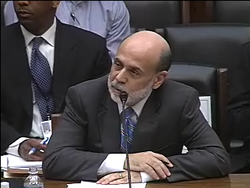U.S., CA could be hit by Federal Reserve potential massive loss
by CalWatchdog Staff | February 28, 2013 1:22 am
 [1]Feb. 28, 2013
[1]Feb. 28, 2013
By Chriss Street
Last week in my article here, “Misery Index about to soar in CA, US[2],” I warned that a rise in a combination of inflation and unemployment, known as the Misery Index[3], could “distort financial markets[4].” And it could result in “significant capital losses[5]” on their huge bond investments of the U.S. Federal Reserve. These distortions and losses would slam the economy, especially in California.
This week, Morgan Stanley heightened those concerns by stating that, if the economy contracted and inflation continued to rise, the U.S. government could suffer a loss of $547 billion[6] on the Fed’s massive portfolio.
Given California’s heavy dependence on federal spending, the state’s treasury would be hit hard. According to a study by the California Budget Project[7], “In federal fiscal year (FFY) 2010, which ended September 30, 2010, $333.8 billion in federal funds came to California. Most of those dollars went directly to Californians without passing through the state budget.” Most of that money went to Social Security, Medicare, military pensions and other direct payments to persons.
Also, the study found that, for the state government, federal spending was “$91.5 billion in the 2010-11 budget — approximately 40 percent of total state expenditures.”
If the Fed’s portfolio loss leads to reduced federal-budget expenditures, California would lose the most of any state.
Bernanke testimony
In his semi-annual testimony to Congress on monetary policy and the economy this week, Federal Reserve[8] Chairman Ben Bernanke[9] was forced to try to reassure financial markets that there was only a very low possibility of an imminent financial crisis. He calmly said, “Where the problem still remains unaddressed is in the longer term. And so it doesn’t quite match to be doing tough policies today when the real problem is a somewhat longer-term problem[10].”
Bernanke went to great lengths to make the case that central bank money printing and bond speculation were prudent stimuli to reinvigorate the American economy. He specifically pointed out that Fed’s easy-money policies have held down interest rates and helped a revival in the housing market and car sales. The chairman also pointed out how a weak job market was more responsible than the Fed for keeping inflation low.
But as I had pointed out, the low inflation rate reported in of the Consumer Price Index has been dramatically understated because 41 percent of the index is real estate returns, which have been down over the last four years[11]. And according to the McKinsey Global Institute Commodity Price Index; the prices for food, raw material, metals and energy prices rose over the last four years to historic highs[12].
During the same period, the price of a gallon of gas rose by 132 percent[13]. And recently the costs of food rose by 8.1 percent[14]. Now that the Fed money-pumping is providing below-market interest-rate financing, real estate inflation is jumping and the CPI will soon spike higher.
Sequestration
President Obama has been desperate over the last two weeks to try to avoid the 2 percent federal spending cuts that are part of the financial sequester. But even after this modest reduction is implemented, the Congressional Budget Office projects that, over eight years, his administration will have engaged in $7.5 trillion in deficit-spending[15] and the national debt will almost have doubled[16].
Bernanke tried to help the president’s cause by uttering the usual concerns that suffering by millions of long-term unemployed was good reason to not make cuts until the economy recovered.
Bernanke was given good marks for his congressional performance. The stock market rebounded and Diane Swonk, chief economist at Mesirow Financial in Chicago, said of Bernanke’s testimony, “Those worried that the Fed may end large-scale asset purchases prematurely should be reassured.” But as I remember, those nice folks from Chicago were also very positive in November 2008 with the election of Barack Obama.
Wasn’t that right before the last financial crisis, where the stock market lost 50 percent of value and unemployment skyrocketed to more than 13 percent in California?
CHRISS STREET & PAUL PRESTON
Present “The American Exceptionalism Radio Talk Show”
Streaming Live Monday through Friday at 7-10 PM
Click here to listen: http://www.ustream.tv/channel/american-eceptionalism-news[17]
Stay Connected on our Websites: www.aexnn.com [18]and www.agenda21radio.com[19]
- [Image]: http://www.calwatchdog.com/?attachment_id=38433
- Misery Index about to soar in CA, US: http://www.calwatchdog.com/2013/02/22/misery-index-about-to-soar-in-ca-us/
- Misery Index: http://www.chrissstreetandcompany.com/2013/02/misery-index-soar/
- distort financial markets: http://thehill.com/blogs/on-the-money/economy/284051-fed-officials-struggle-with-easing-implications-exit#ixzz2LYf3UZhj
- significant capital losses: http://thehill.com/blogs/on-the-money/economy/284051-fed-officials-struggle-with-easing-implications-exit#ixzz2LYf3UZhj
- U.S. government could suffer a loss of $547 billion: http://www.bloomberg.com/news/2013-02-26/fed-faces-explaining-billion-dollar-losses-in-stress-of-qe3-exit.html
- a study by the California Budget Project: http://www.cbp.org/pdfs/2011/111117_How_Are_Federal_Dollars_Spent_pb.pdf
- Federal Reserve: http://topics.bloomberg.com/federal-reserve/
- Ben Bernanke: http://topics.bloomberg.com/ben-s.-bernanke/
- Where the problem still remains unaddressed is in the longer term. And so it doesn’t quite match to be doing tough policies today when the real problem is a somewhat longer-term problem: http://www.latimes.com/business/la-fi-bernanke-hearing-20130227,0,79369.story
- low inflation rate reported in of the Consumer Price Index has been dramatically understated because 41 percent of the index is real estate returns, which have been down over the last four years: http://www.chrissstreetandcompany.com/2013/02/misery-index-soar/
- McKinsey Global Institute Commodity Price Index; the prices for food, raw material, metals and energy prices rose over the last four years to historic highs: http://community.cengage.com/GECResource/blogs/gec_blog/archive/2011/11/28/mckinsey-global-institute-report-commodity-prices-to-remain-high-and-volatile.aspx
- price of a gallon of gas rose by 132 percent: http://gasbuddy.com/gb_retail_price_chart.aspx
- costs of food rose by 8.1 percent: http://research.stlouisfed.org/fred2/graph/?g=8l2
- $7.5 trillion in deficit-spending: http://www.usgovernmentspending.com/fed_spending_2010USrn
- national debt will almost have doubled: http://www.usgovernmentspending.com/fed_spending_2014USrn
- http://www.ustream.tv/channel/american-eceptionalism-news: http://www.ustream.tv/channel/american-eceptionalism-news
- www.aexnn.com : http://www.edtalkradio.com/
- www.agenda21radio.com: http://www.agenda21radio.com/
Source URL: https://calwatchdog.com/2013/02/28/u-s-ca-could-be-hit-by-federal-reserve-potential-massive-loss/